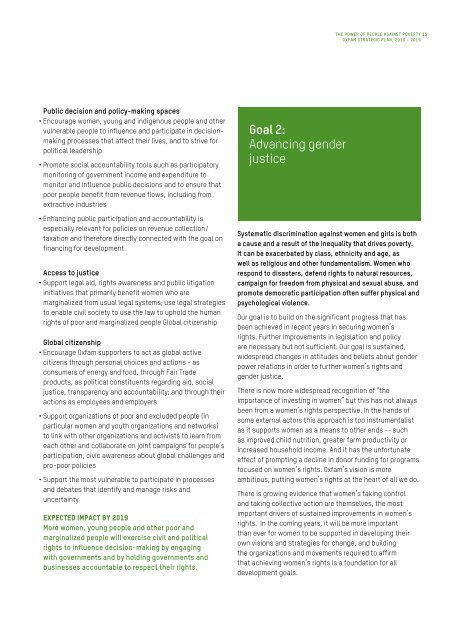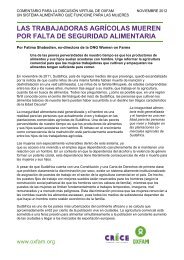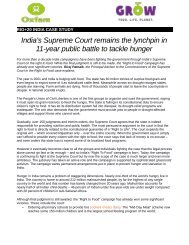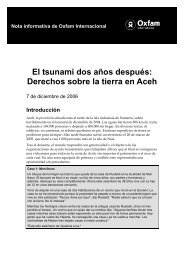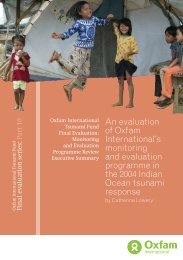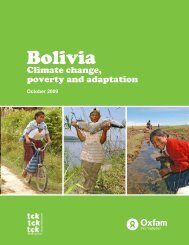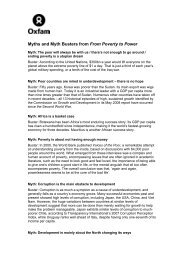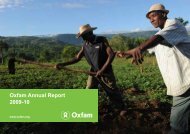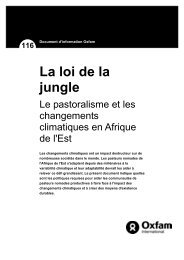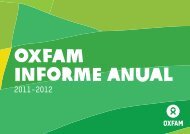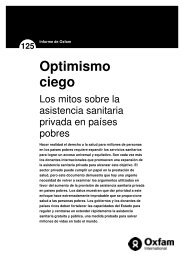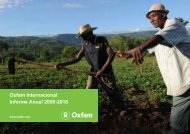Oxfam Strategic Plan, 2013-2019 - Oxfam International
Oxfam Strategic Plan, 2013-2019 - Oxfam International
Oxfam Strategic Plan, 2013-2019 - Oxfam International
You also want an ePaper? Increase the reach of your titles
YUMPU automatically turns print PDFs into web optimized ePapers that Google loves.
THE POWER OF PEOPLE AGAINST POVERTY 15<br />
OXFAM STRATEGIC PLAN, <strong>2013</strong> – <strong>2019</strong><br />
Public decision and policy-making spaces<br />
• Encourage women, young and indigenous people and other<br />
vulnerable people to influence and participate in decisionmaking<br />
processes that affect their lives, and to strive for<br />
political leadership<br />
• Promote social accountability tools such as participatory<br />
monitoring of government income and expenditure to<br />
monitor and influence public decisions and to ensure that<br />
poor people benefit from revenue flows, including from<br />
extractive industries<br />
• Enhancing public participation and accountability is<br />
especially relevant for policies on revenue collection/<br />
taxation and therefore directly connected with the goal on<br />
financing for development<br />
Access to justice<br />
• Support legal aid, rights awareness and public litigation<br />
initiatives that primarily benefit women who are<br />
marginalized from usual legal systems; use legal strategies<br />
to enable civil society to use the law to uphold the human<br />
rights of poor and marginalized people Global citizenship<br />
Global citizenship<br />
• Encourage <strong>Oxfam</strong> supporters to act as global active<br />
citizens through personal choices and actions - as<br />
consumers of energy and food, through Fair Trade<br />
products, as political constituents regarding aid, social<br />
justice, transparency and accountability; and through their<br />
actions as employees and employers<br />
• Support organizations of poor and excluded people (in<br />
particular women and youth organizations and networks)<br />
to link with other organizations and activists to learn from<br />
each other and collaborate on joint campaigns for people’s<br />
participation, civic awareness about global challenges and<br />
pro-poor policies<br />
• Support the most vulnerable to participate in processes<br />
and debates that identify and manage risks and<br />
uncertainty<br />
Expected impact by <strong>2019</strong><br />
More women, young people and other poor and<br />
marginalized people will exercise civil and political<br />
rights to influence decision-making by engaging<br />
with governments and by holding governments and<br />
businesses accountable to respect their rights.<br />
Goal 2:<br />
Advancing gender<br />
justice<br />
Systematic discrimination against women and girls is both<br />
a cause and a result of the inequality that drives poverty.<br />
It can be exacerbated by class, ethnicity and age, as<br />
well as religious and other fundamentalism. Women who<br />
respond to disasters, defend rights to natural resources,<br />
campaign for freedom from physical and sexual abuse, and<br />
promote democratic participation often suffer physical and<br />
psychological violence.<br />
Our goal is to build on the significant progress that has<br />
been achieved in recent years in securing women’s<br />
rights. Further improvements in legislation and policy<br />
are necessary but not sufficient. Our goal is sustained,<br />
widespread changes in attitudes and beliefs about gender<br />
power relations in order to further women’s rights and<br />
gender justice.<br />
There is now more widespread recognition of “the<br />
importance of investing in women” but this has not always<br />
been from a women’s rights perspective. In the hands of<br />
some external actors this approach is too instrumentalist<br />
as it supports women as a means to other ends -- such<br />
as improved child nutrition, greater farm productivity or<br />
increased household income. And it has the unfortunate<br />
effect of prompting a decline in donor funding for programs<br />
focused on women’s rights. <strong>Oxfam</strong>’s vision is more<br />
ambitious, putting women’s rights at the heart of all we do.<br />
There is growing evidence that women’s taking control<br />
and taking collective action are themselves, the most<br />
important drivers of sustained improvements in women’s<br />
rights. In the coming years, it will be more important<br />
than ever for women to be supported in developing their<br />
own visions and strategies for change, and building<br />
the organizations and movements required to affirm<br />
that achieving women’s rights is a foundation for all<br />
development goals.


